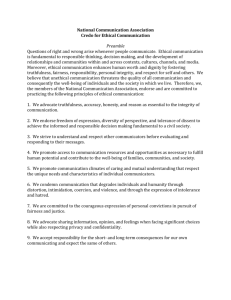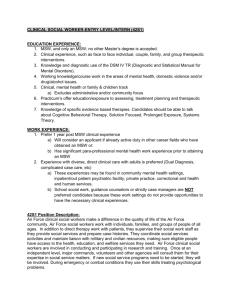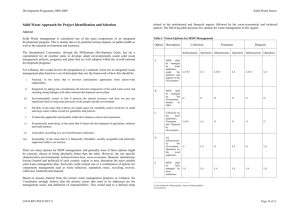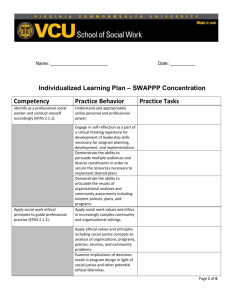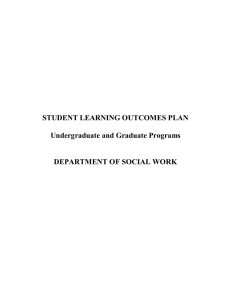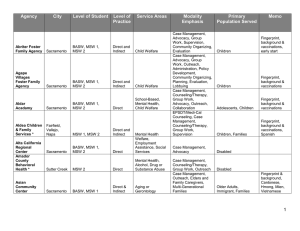Competencies and Practice Behaviors (12
advertisement
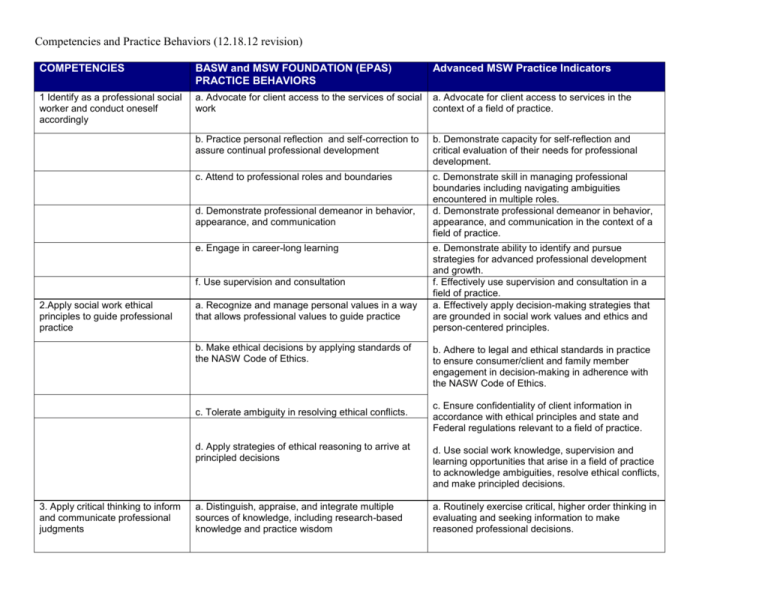
Competencies and Practice Behaviors (12.18.12 revision) COMPETENCIES BASW and MSW FOUNDATION (EPAS) PRACTICE BEHAVIORS Advanced MSW Practice Indicators 1 Identify as a professional social worker and conduct oneself accordingly a. Advocate for client access to the services of social work a. Advocate for client access to services in the context of a field of practice. b. Practice personal reflection and self-correction to assure continual professional development b. Demonstrate capacity for self-reflection and critical evaluation of their needs for professional development. c. Attend to professional roles and boundaries c. Demonstrate skill in managing professional boundaries including navigating ambiguities encountered in multiple roles. d. Demonstrate professional demeanor in behavior, appearance, and communication in the context of a field of practice. d. Demonstrate professional demeanor in behavior, appearance, and communication e. Engage in career-long learning f. Use supervision and consultation 2.Apply social work ethical principles to guide professional practice a. Recognize and manage personal values in a way that allows professional values to guide practice b. Make ethical decisions by applying standards of the NASW Code of Ethics. c. Tolerate ambiguity in resolving ethical conflicts. 3. Apply critical thinking to inform and communicate professional judgments e. Demonstrate ability to identify and pursue strategies for advanced professional development and growth. f. Effectively use supervision and consultation in a field of practice. a. Effectively apply decision-making strategies that are grounded in social work values and ethics and person-centered principles. b. Adhere to legal and ethical standards in practice to ensure consumer/client and family member engagement in decision-making in adherence with the NASW Code of Ethics. c. Ensure confidentiality of client information in accordance with ethical principles and state and Federal regulations relevant to a field of practice. d. Apply strategies of ethical reasoning to arrive at principled decisions d. Use social work knowledge, supervision and learning opportunities that arise in a field of practice to acknowledge ambiguities, resolve ethical conflicts, and make principled decisions. a. Distinguish, appraise, and integrate multiple sources of knowledge, including research-based knowledge and practice wisdom a. Routinely exercise critical, higher order thinking in evaluating and seeking information to make reasoned professional decisions. COMPETENCIES BASW and MSW FOUNDATION (EPAS) PRACTICE BEHAVIORS Advanced MSW Practice Indicators b. Analyze models of assessment, prevention, intervention and evaluation. b. Evaluate assessment and intervention options based on evidence-based findings, practice wisdom and understanding of client strengths and needs. c. Demonstrate skillful written and oral communication that is clear, focused and relevant to practice context. c. Demonstrate effective oral and written communication in working with individuals, families, groups, organizations, communities & colleagues. 4 Engage diversity and difference in practice a. Recognize the extent to which a culture's structures and values may oppress, marginalize, alienate or create or enhance privilege and power b. Gain sufficient self awareness to eliminate the influence of personal biases and values in working with diverse groups; 5 Advance human rights and social and economic justice 6 Engage in research informed practice and practice informed research). a. Apply a transcultural perspective in practice, including understanding of structural contexts and dynamics of power, privilege and oppression that influence interaction at micro, mezzo, and macro levels. b. Demonstrate self-reflexivity and use strengthbased approaches in working with diverse client systems in a culturally responsive practice. c. Recognize and communicate their understanding of the importance of difference in shaping life experiences c. Demonstrate understanding of ways that social location (or positionality) and difference shape perspectives and experiences of both professionals and client systems. d. View themselves as learners and engage those with whom they work as informants. d. Consistently demonstrate skill in learning from diverse client systems and forming respectful partnerships in the context of a field of practice. a. Understand the forms and mechanisms of oppression and discrimination b. Advocate for human rights and social and economic justice; a. Demonstrate an understanding of historical, social, political, and economic factors affecting clients and communities in the context of a field of practice, including dynamics related to stigma and discrimination. b. Demonstrate ability to advocate for social and economic justice in the context of a field of practice. c. Engage in practices that advance social and economic justice. c. Engage in practices to improve social and economic justice in the context of a field of practice. a. Use practice experience to inform scientific inquiry a. Demonstrate ability to use practice experience to inform research or evaluation in the context of a field of practice. COMPETENCIES 7 Apply knowledge of human behavior and the social environment 8 Engage in policy practice to advance social & economic well being and to deliver effective social services BASW and MSW FOUNDATION (EPAS) PRACTICE BEHAVIORS Advanced MSW Practice Indicators b. Use research evidence to inform practice. Demonstrate ability to apply research evidence and research skills to inform and improve practice. a. Utilize conceptual frameworks to guide the processes of assessment, intervention, and evaluation a. Utilize conceptual frameworks to guide the processes of assessment, intervention, and evaluation in a field of practice. b. Critique and apply knowledge to understand person and environment b. Demonstrate the ability to critically evaluate and apply knowledge about human behavior and the social environment from diverse perspectives in a field of practice. a. Demonstrate understanding of policies and programs in a specific field of practice, as well as skills for analyzing and influencing policies and programs a. Analyze, formulate, and advocate for policies that advance social well being b. Collaborate with colleagues and clients for effective policy action 9 Respond to contexts that shape practice a. Continuously discover, appraise and attend to changing locales, populations, scientific and technological advancements, and emerging societal trends to provide relevant services b. Provide leadership in promoting sustainable changes in service delivery and practice to improve the quality of social services. 10 Engage, assess, intervene, and evaluate with individuals, families, groups, organizations, and communities b. Demonstrate ability to collaborate with stakeholders to influence policy and program changes in a field of practice. a. Demonstrate awareness of and good judgment in assessing and adapting to changing social conditions, emerging trends, and advances in science and technology to provide relevant services in a field of practice. b. Demonstrate skill in interagency and multidisciplinary practice including effective collaboration with other professionals and organizations. a. Substantively and affectively prepare for action with individuals, families, groups, organizations and communities. a. Respectfully and skillfully establish effective working relationships with clients and community partners in accord with social work values. b. Use empathy and other interpersonal skills b. Consciously utilize empathy, respect, understanding and other interpersonal skills in establishing effective client relationships. c. Apply social work practice skills to effectively identify and work towards the accomplishment of shared goals. 10(a) Engagement c. Develop a mutually agreed on focus of work and desired outcomes COMPETENCIES BASW and MSW FOUNDATION (EPAS) PRACTICE BEHAVIORS Advanced MSW Practice Indicators 10 (b) Assessment a. Collect, organize and interpret client data a. Demonstrate ability to gather, analyze, and interpret assessment information in an objective and coherent manner. b. Apply social work practice skills to conduct assessments that identify client strengths and needs. c. Demonstrate ability to work with individuals, family members, and community providers to develop coordinated intervention plans. d. Demonstrate ability to evaluate and select intervention plans appropriate to client needs and practice context. a. Demonstrate ability to engage in actions consistent with service and organizational goals. b. Assess client strengths and limitations c. Develop mutually agreed-on intervention goals and objectives d. Select appropriate intervention strategies 10 (c) Intervention a. Initiate actions to achieve organizational goals b. Implement prevention interventions that enhance client capacities c. Help clients resolve problems 10 (d) Evaluation b. Demonstrate ability to identify and utilize prevention measures that enhance client strengths and resilience. c. Demonstrate ability to problem solve with clients, in the context of a field of practice. d. Negotiate, mediate, and advocate for clients d. Demonstrate an ability to negotiate, mediate, and advocate successfully for clients. e. Facilitate transitions and endings e. Apply social work practice skills to effectively engage in transition and termination processes with clients. a. Demonstrate ability to critically analyze, monitor, and evaluate interventions in the context of a field of practice. a. Social workers critically analyze, monitor and evaluate interventions
